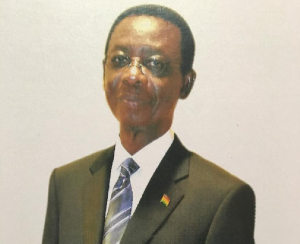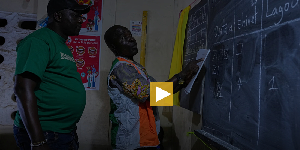Foreign Minister Nana Akufo-Addo says contrary to criticism the just completed G8 summit provided a good opportunity for Africa to make its case to the world's wealthiest nations.
But the Minister, in an exclusive interview with The Statesman, cautioned Africans not to expect the G8 or donations, in general, to "resolve the problems of the continent for us.”
Instead, Nana Akufo-Addo pushed the notion of partnership as a way for Africa to take greater control of its own affairs.
“Partnership doesn’t imply reliance. It implies mutual benefit. We are under no illusions about the fact that Africa’s destiny has to be crafted, determined, led and won by Africans, primarily with far greater interdependency and partnership among Africans than was seen in the past.”
Last month in Brussels, Nana Akufo-Addo, with support from his South African counterpart Nkosazana Dlamini-Zuma, stood up against Europe dictating to Africa, with Nana Akufo-Addo telling the European Union that they could not pick and choose which African leaders or states could take part in economic partnership negotiations between the two continental bodies.
Thus, last Friday, German Chancellor Angela Merkel, whose country holds the EU presidency, conceded that December’s EU-African Union summit would go ahead even if Zimbabwean President Robert Mugabe attended.
December’s EU-AU summit anticipates the launching of a new "strategic partnership" upgrading ties with African nations, with closer cooperation linked to political and economic reforms. Portugal, which takes over the rotating EU presidency from Germany in July, views the summit as key to that goal, Portuguese Foreign Minister Luis Amado has said.
However, preparations for the summit had been hampered over what to do with President Mugabe. In 2003, an EU-African summit in Lisbon was cancelled when some African nations balked at the EU refusing to let Mugabe attend. The EU has imposed a travel ban on Mugabe and more than 100 government members in response to his authoritarian policies.
According to diplomatic sources, diplomatic pressure from Ghana, which holds the chairmanship of the African Union, and South Africa, the President of which was appointed in March by the Southern African Development Community as facilitator to resolve tensions in Zimbabwe, which eventually forced the European Union to allow President Mugabe to attend may signal a new muscular political posture from Africa when it comes negotiations with its richer counterparts.
Chancellor Merkel acknowledged, "It cannot be the case that we do not work with a continent just because one country commits unspeakable acts. So everybody will be invited," said Merkel at the final press conference of the G8 summit in Heiligendamm in Germany.
This was after Nana Akufo-Addo had issued a public statement to EU governments not to block President Mugabe from attending the December summit in Lisbon, Portugal, which is meant to revive Europe-Africa ties.
"It poses delicate issues for us," Akufo-Addo told reporters after talks with EU officials. "We can’t have a situation where people pick and choose what Africans they will deal with if they try to deal with Africa on a continental basis. It is a summit and if it’s a summit, Zimbabwe comes at the level of its leader or somebody in a representative capacity."
Meanwhile, President Kufuor scored a major point in the partnership drive between African and the G8 last week. As part of the drive towards greater co-operation, President Kufour, in his role as Chairman of the African Union, proposed forming a watchdog body responsible for supporting and regularly reviewing the co-operation between African nations and the developed world. The President told G8 members at the German conference that the body could serve to help keep the G8 on track with its aid commitments, while ensuring Africa monitors itself to assure nations reach minimal standards of human rights and good governance.
Nana Akufo-Addo believes the proposal could end up forming the "essential mechanism for monitoring compliance" between the two parties. But, he made it clear the monitoring would not serve only one partner. The Foreign Minister points out four nations promised debt relief by the G8 are still waiting.
While the G8 claimed in Germany that the relief is "well on its way," Nana Akufo-Addo envisions a time when it would be easier to check on the progress of the developed world’s promises. "Some parts of the [debt] commitments have been met - it’s important to have the central mechanism to make sure they all are," he says.
The Minister was also "very encouraged" by the G8 nation’s commitment to help improve African economies. The world’s leading industrialised nations promised to promote "growth" and "investment" in Africa, the Minister says sticking to that commitment will go a long way in helping African continents "compete" with the rest of the world. The summit which ended at the weekend discussed several major global issues. Among them was the subject of African aid. At the meeting the G8 nations proposed a 60-billion dollar aid package aimed at fighting communicable diseases like HIV/AIDS, Malaria and Tuberculosis.
About half of that money is expected to come from the United States. The programme also aims to pay special attention to the needs of females infected with the three diseases.
While Nana Akufo-Addo says the HIV issue "isn’t as big an issue" in Ghana he was happy to see the G8 take steps to help alleviate what many see as the continent’s largest health issue.
However the G8’s new plan has already come under fire. Chief amongst the complaints is that the $60-billion dollar package is far less lucrative than it seems. Critics charge the amount is largely made up of previously announced funding, and that the G8 is playing a public relations game by putting forth the figure.
Critics also took issue with the vague wording for when the money would be spent – with the G8 stating the aid would be delivered in "the coming years". The Canadian Broadcasting Corporation reported former UN special envoy for HIV/AIDS in Africa Stephen Lewis feels the G8 has abandoned Africa. Lewis questioned the "moral compass" of the world’s leaders, questioning why the G8 spends $120-billion a year on the conflicts in Iraq and Afghanistan but can’t firmly commit to spending half that amount on Africa.
The G8 did earn some positive reviews in other areas. Tearfund, a British Christian relief and development agency, called the organisation’s plan to halve the amount of greenhouse gas emissions by 2050 "significant progress". The group also aims to "seriously consider" adopting the scientific communities goal of keeping world temperatures from rising more than two degrees Celsius. The two moves were hailed by UN Secretary General Ban Ki-moon as "strong and early action [taken] to combat climate change". However environmental watchdog Greenpeace gave the summit failing marks on its "climate scorecard" saying the G8 language doesn’t oblige any of the world’s largest polluters to actually hit the targets mentioned. Daniel Mittler the climate policy advisor for Greenpeace at the summit claimed the deal is "clearly not enough to prevent dangerous climate change". Other critics also targeted what they referred to as weak language. French paper "La Tribune" wrote there could be "no talk of triumph" as real change "required more than a fraction of a sentence which everyone can interpret as he likes the next day." While Italy’s La Repubblica claimed "declarations of intent are not sufficient; the problem is much too urgent."
General News of Tuesday, 12 June 2007
Source: Statesman












